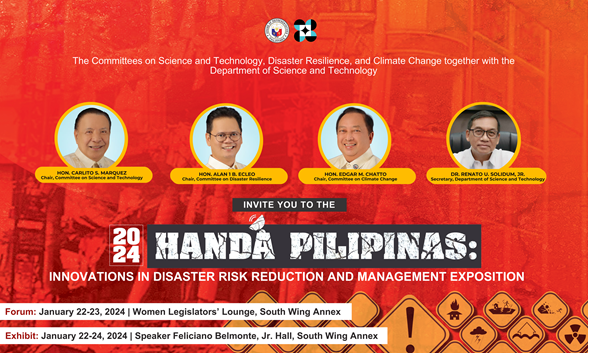Gearing up for disasters: DOST showcases 'ready-to-adopt' technologies at 'Handa Pilipinas 2024'
The Department of Science and Technology (DOST) on Monday, Jan. 22 spearheaded the "2024 Handa Pilipinas: Innovation in Disaster Risk Reduction and Management Exposition" by showcasing its latest "ready-to-adopt" technologies at the House of Representatives in Quezon City.

In a video message during the event, DOST Secretary Renato U. Solidum Jr. emphasized the crucial role of science and technology in disaster preparedness and mitigation.
"We can transform victims of disasters into victors over disasters through science and technology," he said.
"Through this Handa Filipinas Exhibit, we aim to equip you with the right science, the right information, and the right technology and to encourage you to act and plan at the right time," he added.
Solidum also delved into the deeper meaning behind the Filipino word "handa," viewing it from two perspectives: handa as an aspiration, symbolizing a community, locality, region, and nation prepared to face any hazard, and handa as a call to action to empower citizens and stakeholders to actively participate in building resilience.
Forefront in preventing hazards from turning into disasters
The DOST is at the forefront of developing and supporting "technologies and innovations" that not only save lives but also protect livelihoods, assets, and future development gains, Solidum said,p.
"We have the power to prevent hazards from turning into disasters. We have the power to protect ourselves, our wealth, and our economy," he added.
He further assured that these technologies would reduce the various risks before the hazard occurrence as the department pushed for innovative solutions that are available, accessible, useful, and most importantly, can be used by the Filipino people.
The three-day event from Jan. 22 to 24 brought together DOST scientists, researchers, and lawmakers to discuss pressing issues in disaster risk reduction and management to foster collaboration and develop policies that strengthen the Philippines' response to natural hazards like typhoons, earthquakes, volcanic eruptions, and landslides.
The DOST Legislative Liaison Office initiatives, in partnership with the House Committees on Science and Technology, Climate Change, and Disaster Resilience, featured a special exhibit, informative technical forums, and insightful discussions.
The Philippine Institute of Volcanology and Seismology (Phivolcs) has presented its tools such as Georisk Platforms Hazard Hunter, GeoAnalytics, GeoMapper, PlanSmart, REDAS (Rapid Earthquake Damage Assessment System Software), How Safe is My House, VolcanoPH, Intensity Meter, and Earthquake Simulator.
READ: https://mb.com.ph/2024/1/22/phivolcs-develops-tools-for-hazard-information-assessment-1
Moreover, the exhibit will further feature a range of advanced technologies, including Radiation-processed Hemostats, Radiation Monitoring Stations in the Philippines, and the Nuclear/Radiological Emergency Preparedness and Response Program of the DOST-Philippine Nuclear Research Institute.
In addition, several other innovative technologies, such as the Augmented-reality Terrain and Flood simulator with Kinetic Sand, Interactive Display Information System, Forecaster's Workstation, Telemetered River Basin Model of Pampanga River Basin—diorama display, and actual units of weather observation instruments from the DOST-PAGASA will also be displayed.